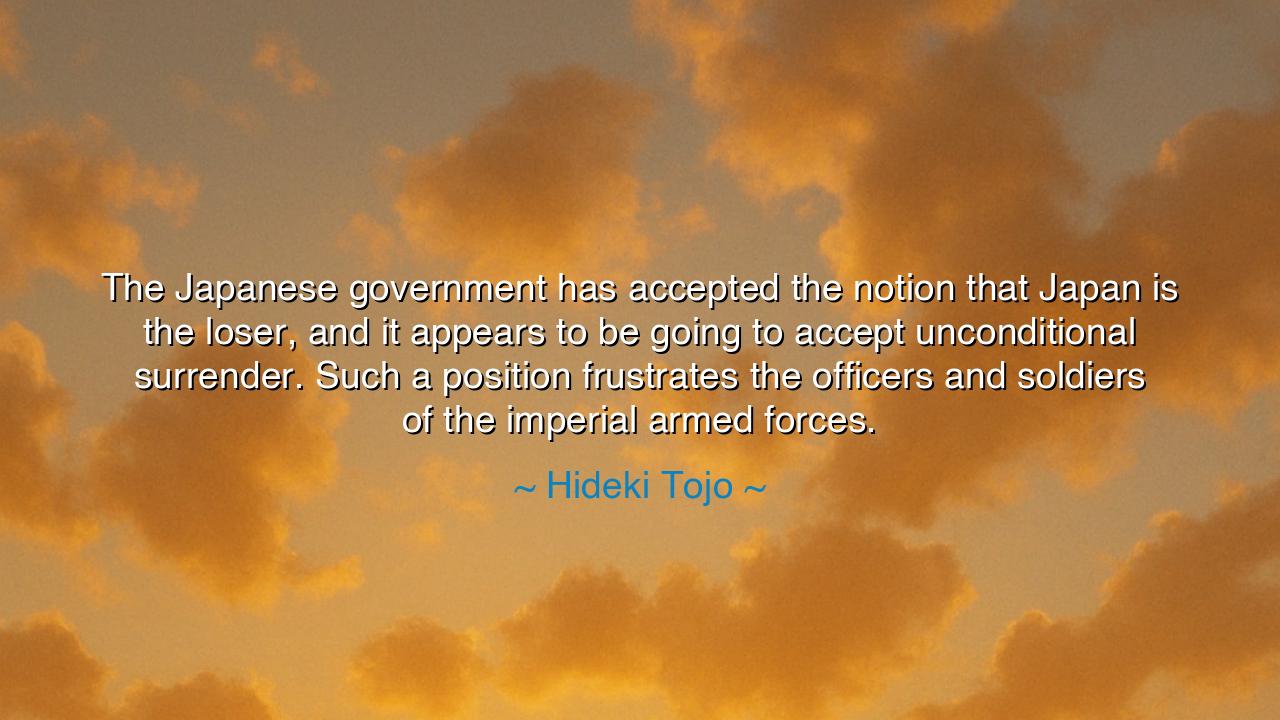
The Japanese government has accepted the notion that Japan is the
The Japanese government has accepted the notion that Japan is the loser, and it appears to be going to accept unconditional surrender. Such a position frustrates the officers and soldiers of the imperial armed forces.






"The Japanese government has accepted the notion that Japan is the loser, and it appears to be going to accept unconditional surrender. Such a position frustrates the officers and soldiers of the imperial armed forces." – Hideki Tojo
In these words, Hideki Tojo, the wartime Prime Minister of Japan, speaks at the twilight of a nation’s tragic pride. His statement, born in the final days of World War II, reflects not only the despair of defeat but the spiritual agony of a people raised in the code of honor, discipline, and sacrifice. The meaning of this quote lies in its tension—the clash between reality and loyalty, between the collapse of empire and the endurance of warrior spirit. Tojo, once the symbol of Japan’s imperial ambition, now confronted the unbearable truth: the empire he had sworn to defend lay shattered, and the soldiers who once fought under his command were being asked to accept what their hearts could not—unconditional surrender.
The origin of this statement lies in the summer of 1945, when Japan, devastated by the atomic bombings of Hiroshima and Nagasaki, faced inevitable defeat. The Emperor and his ministers moved toward surrender to save what remained of their nation. Yet for men like Tojo, shaped by the unyielding code of Bushidō—the way of the warrior—such surrender was not merely political; it was spiritual death. In their eyes, to accept defeat was to betray the ancestors, to dishonor the fallen, to desecrate the sacred duty of the soldier. Thus, Tojo’s words embody the anguish of a generation raised to fight to the last breath, forced instead to bow before fate.
In his reflection, we hear the echo of an ancient tragedy—the moment when pride and realism collide. Tojo’s frustration with surrender reveals the universal struggle between the ideals of duty and the necessities of survival. Like the last defenders of Masada or the doomed Spartans at Thermopylae, he spoke from a world where honor meant more than life itself. Yet history, ever merciless, teaches that there are moments when even the proudest must bend, when survival demands submission. For Japan, surrender was not only the end of war—it was the end of an age. The old gods of conquest were falling, and in their place, a new Japan would rise from ashes.
Consider the story of General Nogi Maresuke, who, decades earlier, had embodied the same spirit that now tormented Tojo. When Emperor Meiji died in 1912, Nogi took his own life in ritual suicide, believing he had failed his Emperor and nation. He did so not from despair but from devotion—to uphold the eternal bond between leader and soldier. This act, though revered in its time, reveals the mindset that shaped Tojo and his peers: that a warrior’s worth lies not in success, but in unquestioning loyalty. When Tojo spoke of frustration among officers and soldiers, he voiced the echo of that same unbending faith—a faith unprepared for the modern realities of total war and unconditional surrender.
Yet beneath Tojo’s words lies a deeper human lesson. His lament is not only about defeat in battle but about the death of illusion—the realization that no empire, no ideology, no army, no leader, can stand against the truth of consequence. The frustration of the soldiers was the frustration of humanity itself when confronted by the limits of its ambition. Pride may carry nations to greatness, but when it blinds them to compassion and restraint, it leads only to ruin. The ashes of Hiroshima were not only the remnants of war; they were the price of hubris—the reminder that no victory is worth the annihilation of conscience.
Tojo’s words also remind us of the danger of unquestioned obedience. The soldiers’ loyalty was fierce, but it was also their prison. They fought with valor, yet their courage was wielded by a system that turned honor into fanaticism. When governments elevate obedience above reason, they create a tragedy where the noble virtues of discipline and patriotism become instruments of destruction. Thus, his statement is both a lament for the soldiers and an indictment of the leaders who failed them.
The lesson, then, is clear and eternal: greatness does not lie in victory alone, but in the wisdom to know when to surrender to truth. A nation, like a man, must learn that honor is not destroyed by humility; it is fulfilled by it. To bury the sword does not mean to lose courage—it means to choose life over pride, wisdom over ruin.
And so, the practical actions are these: let every leader remember that power must always serve humanity, not consume it. Let every citizen remember that loyalty, without conscience, becomes a weapon of tyranny. And let every nation remember that the mightiest walls of empire crumble not from force, but from blindness within. In the fall of Hideki Tojo’s Japan, we are reminded of the ancient truth that all glory fades, but the spirit of repentance, rebuilding, and compassion endures. For only from the humility of defeat can a people rise again—stronger, wiser, and truly free.






AAdministratorAdministrator
Welcome, honored guests. Please leave a comment, we will respond soon